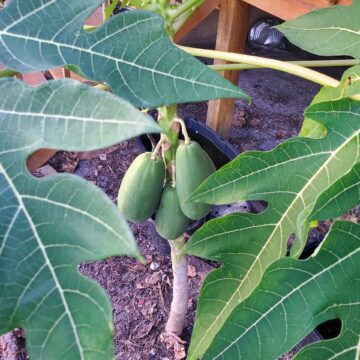Description
These seeds are from our own trees. These trees are self-fertile, which means it is likely that these seeds can producce self-fertile plants
Papaya is both attractive and an excellent permaculture plant. Papaya fruits can actually be eaten green more like a vegetable or fresh when fully ripe.. You will have fruits on the tree for several months, but there is usually no immediate rush to pick them like some other fruits. If you run into an early frost, or your papaya hasn’t fully developed, you can try a green papaya salad. The leaves are also used as a medicinal herb. Papaya plants are relatively easy to grow and can survive frost if you wrap the trunks and mulch the base, allowing you several years of fruit from one single plant.
Papaya is killed at temperatures below 31 degrees Fahrenheit, but we have had plants live through multiple nighttime temperatures in the mid to low 20s with wrapping and mulching. Of course, you can grow it as a container plant in a 15-20 gallon pot or larger and bring it in the house or a greenhouse for the winter. Papaya trees are considered hardy outdoors from zones 9B to 11. In colder areas, an alternative to lugging huge pots with trees in them between seasons is starting them ahead of time, bringing the young plants in for the first winter and then treating them as an annual. If you put them in the ground at about 2-3 feet, which is easy to do indoors or in a greenhouse, you should be able to get fruit from the plant in a single season beyond its recommended zone. And you can keep your crops going by taking cuttings or air layering.
Papaya plants enjoy a lot of water and good feeding. You want the plants well-watered but not pooling., so planting them in a mound with a raised ring for water collection will help with that. You can throw your kitchen scraps, egg shells and coffee grounds on your plants to give extra nutrients. But otherwise, you will want to fertilize like other fruits trees, heavy on nitrogen early in the year with a dose of bone meal or a blooming/fruiting fertilizer as blooms begin to form. If you do not experience frost, you should continue to get new papayas forming as the plant grows. The blooms themselves are also really nice.
Papaya contains papain, which is a digestive enzyme that not only support digestion, it works as a meat tenderizer. Try a bit of papaya enzyme next time you marinate meat for the grill. You can use the fruit ripe or unripe as a puree with your marinade.
Growing Information: Start your papaya seeds by soaking them in hot water for at least a day, but longer if possible. You can use potassium nitrate or a 250ppm solution of ga-3 for 48 hours for added benefit. You want the seeds to soak up as much moisture in this process as possible because they do germinate slowly and irregularly. Choose a well draining soil with about 50% compost and 50% soil. Any soil that is fertile and well-draining will work. A soil ph of 6-6.5 is ideal. Bury your seeds about ½ – ¾”. Keep the soil moist and out of direct sunlight. Papaya seedlings can be sensitive to direct sunlight. The mature plants also seem to prefer filtered sunlight. You may notice them wilt in the hotter moments. If you keep the plant well-watered, you should see the results in terms of growth. Papaya also likes high humidity. If you move your papaya indoors, be sure to cut it back.
In purchasing, international buyers agree to assume the risk of arrival of all items. We cannot replace lost or seized items. You will be required to confirm that you agree to these terms before items can be sent.








